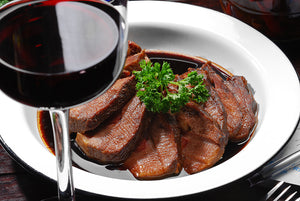Wine Pairing Suggestions For Your Easter Weekend Dining
Mar 18, 2024
With Easter just around the corner, many of us will be planning a special meal over the bank holiday weekend to enjoy with family or friends. The festival is closely associated with food as it marks the end of Lent, a period of 40 days beginning on Shrove Tuesday when people traditionally fasted for religious observance.
For example, fish is traditionally eaten on Good Friday, and roast meat is served for Easter Sunday lunch. In between of course, plenty of chocolate treats may be consumed! If you are following these customs, you may be wondering which wine to pair with the food. A crisp Argentinian white for example, or a full bodied red?
There are no strict rules to follow, and it can simply be a matter of personal taste, which is fine as we all have individual preferences. However, certain types of foods and flavours do tend to go better with some wines than others. Here are some points to consider.
Wine to pair with fish
When it comes to selecting the perfect wine for a fish dish, consider the intensity of the flavour. For example, smoked salmon has a strong flavour that works well with New World white wines from Chile, Argentina and New Zealand.
White wine from the warmer regions of the world tends to be sweeter and bolder in flavour because the grapes ripen more quickly, so it won’t be overwhelmed by strong tasting fish. You might even consider pairing it with rosé.
If you are serving white fish with a more delicate flavour and a citrusy dressing, try pairing it with a white from France, Germany, or even England. These wines are produced from grapes in cooler climates that take longer to ripen, and have a higher level of acidity. This gives a crisp and sophisticated flavour that complements the white fish and citrus.
Wine to pair with lamb
Red wine is traditionally served with lamb to complement the qualities of the meat. Lamb is less pungent and rich than beef, so it works best with light to medium bodied reds that have a moderate amount of tannins.
These are compounds that are present in the skins of grapes, and red wine has a higher tannin content because it is fermented with the skin on, unlike white wine. The tannins have an astringent and bitter taste, and depending on the ripeness of the grape, they add to the texture of the wine.
The other point to consider is that lamb easily takes on the flavour of marinades, herbs, and sauces as it cooks. If you are using a sweet sauce such as redcurrant jelly, choose a full-bodied red such as Cabernet Sauvignon or Shiraz.
If you are making a lamb stew with lots of flavourings and seasoning, choose a light-bodied red to avoid overwhelming the taste, such as Pinot Noir or Merlot.
Wine to pair with beef
Red wine is the classic choice to pair with roast beef dishes. Leaner beef goes well with lighter reds that are produced with less ripe grapes from cooler growing regions and will be slightly grainy in texture and more acidic. This will help to cut through the drier texture of the meat. Grenache or Tempranillo could be good choices.
If the beef is fatty or cooked in rich sauces, it will pair well with full-bodied reds such as Malbec or Shiraz. Very ripe grapes give a full-bodied and velvety quality to the wine, which holds up well against the texture of the meat. The high tannin content has a drying effect that will counteract the greasiness of the meat.
Wine to pair with pork
Pork is a very flexible choice when it comes to wine pairings. Saltier pork will go well with sweet and fruity red or white wine, while pork cooked in a sweet marinade or sauce go well with more acidic wines.
Wine to pair with sweet foods
Easter is traditionally a time for lots of sweet treats, from chocolate to hot cross buns. Wine and very sweet sugary foods that coat the lining of the mouth are not always a great match, because sweetness tends to overpower the more complex flavours of the wine. However, a light sparkling wine such as prosecco or champagne can work very well.


